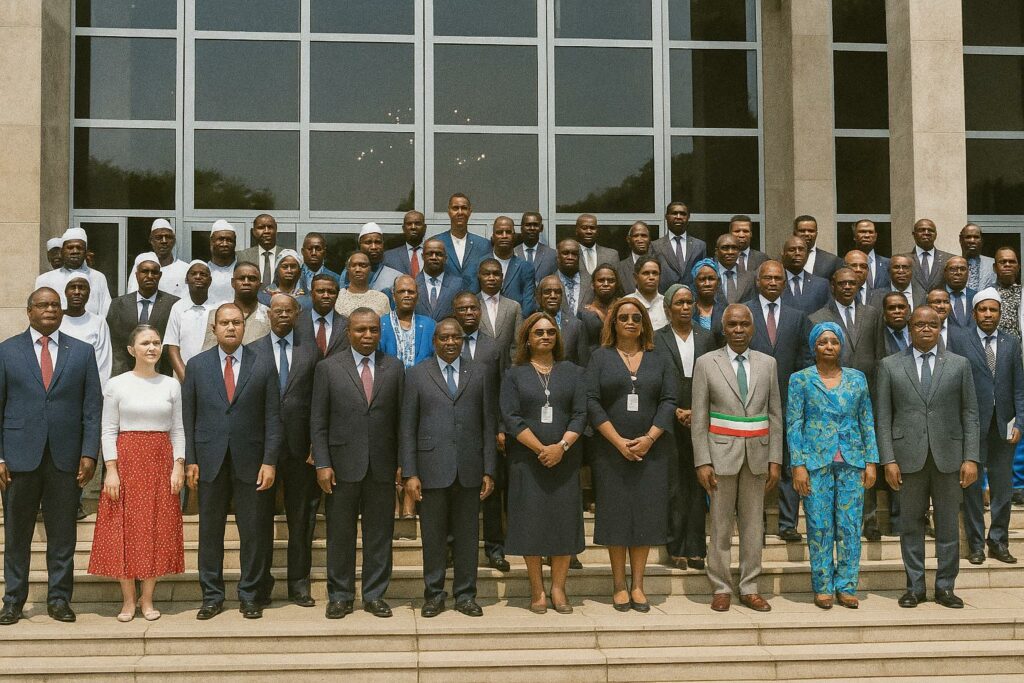Contextualising Congo’s Human Capital Challenge
In the geopolitical conversation on Central Africa, Congo-Brazzaville is often framed through the prism of hydrocarbons. Yet the leadership in Brazzaville has, for several years, placed equal rhetorical and financial weight on a less visible asset: the demographic dividend represented by the country’s 4.5 million inhabitants, sixty per cent of whom are under thirty (World Bank, 2023). The National Development Plan 2022-2026 explicitly calls for a “knowledge-based diversification” designed to buttress macro-economic resilience as global demand for oil enters uncertain terrain. Within that plan, the university system is identified as a strategic hinge between social cohesion and economic modernisation. Against this backdrop, the two-day Assises sur l’Employabilité et l’Entrepreneuriat des Étudiants, opened on 30 June by Prime Minister Anatole Collinet Makosso, assume a significance that is both domestic and diplomatic.
Government’s Pact with Academia and Industry
Addressing a packed amphitheatre at the Université Marien-Ngouabi, the Prime Minister invoked what he termed “a new social contract of competences”, insisting that training programmes must evolve at the tempo of market demand. His remarks echo President Denis Sassou Nguesso’s recurrent call for “an economy of skills” articulated during the Forum national de la jeunesse in 2021. Minister of Higher Education Professor Delphine Edith Emmanuel gave operational contours to the pledge, advocating modular curricula anchored in professional certification, digital literacy and green economy vocations. Six cabinet colleagues—among them the ministers of economy, finance and digital transition—joined her in a plenary exchange with students, signalling inter-ministerial ownership of the agenda. That choice of format contrasts with prior sector-specific seminars and reflects an ambition to mainstream employability across policy silos.
UN Agencies and Private Sector as Catalysts
The United Nations Educational, Scientific and Cultural Organization, represented by Fatoumata Marega, recalled that the Brazzaville summit flows directly from the 2022 États généraux de l’éducation nationale, where UNESCO committed technical assistance to competency-based curricula and tracer studies. Parallel to multilateral engagement, the Union patronale et interprofessionnelle du Congo pledged to co-design syllabi and expand internship quotas. Its secretary-general, Nancy Chenard, told delegates that “the private sector is prepared to become a classroom without walls”. Such language resonates with African Development Bank diagnostics highlighting that sub-Saharan enterprises cite skill shortages, not capital scarcity, as the principal constraint to growth (AfDB, 2024). The convergence of external expertise and domestic capital thus offers a rare alignment of incentives.
Students’ Voice and the Entrepreneurial Turn
Student union leader Chérubin Ibara urged that the proceedings be viewed not as an administrative full stop but as a semantic overture to a new pedagogy. Many undergraduates expressed cautious optimism, pointing to recent pilot incubators on the Talangaï and Kintélé campuses where cohorts have prototyped agri-tech applications with seed funding from the national investment promotion agency. Early data are encouraging: of the fifty-two start-ups launched under the 2023 campus innovation challenge, thirty-one have progressed beyond proof-of-concept and employ a cumulative two hundred and sixteen graduates, according to the Ministry of SMEs. While modest in absolute terms, these figures hint at an emerging entrepreneurial culture that could rebalance a labour market long oriented toward public-sector absorption.
Regional Resonance and Diplomatic Implications
Congo-Brazzaville’s educational recalibration intersects with a broader Central African discourse on mobility and mutual recognition of qualifications under the Economic Community of Central African States. Diplomats from Cameroon and Gabon attended the summit, interpreting Brazzaville’s initiative as an overture to harmonised accreditation frameworks. Such signalling is not merely technocratic. In an era where youth unemployment has become a predictor of political volatility across the continent, Congo’s decision to foreground employability doubles as a preventive diplomacy tool. By fostering a labour ecosystem that privileges innovation over frustration, the government reinforces domestic stability while enhancing its credibility in regional soft power corridors.
International observers also note that the summit dovetails with Paris Agreement commitments, given the emphasis on renewable-energy engineering and climate-smart agriculture within the proposed new courses. This alignment positions Congo to tap into green-finance envelopes increasingly conditioned on demonstrable human-capital pipelines.
Toward a Measurable Social Return on Knowledge
The true test of the Brazzaville assises will lie in metrics: graduate employment rates, start-up survival beyond thirty-six months and the elasticity of curricula to future shocks such as artificial intelligence. The Ministry of Higher Education has announced a results framework to be published each academic year, incorporating labour-market dashboards developed with the National Statistics Institute. If implemented, this evidence-based governance could set a benchmark in a region where data scarcity often clouds policy evaluation. That prospect explains why several donor agencies, including the European Union Trust Fund, have discreetly signalled interest in co-financing the monitoring architecture.
By convening government, business and learners around the same table, the Republic of Congo has taken an incremental yet symbolically potent step towards translating demographic weight into productive capability. For a nation charting its post-oil horizon, the transition from lecture hall to market hall may well define the next chapter of its development narrative—and, by extension, its diplomatic voice on the continent.

